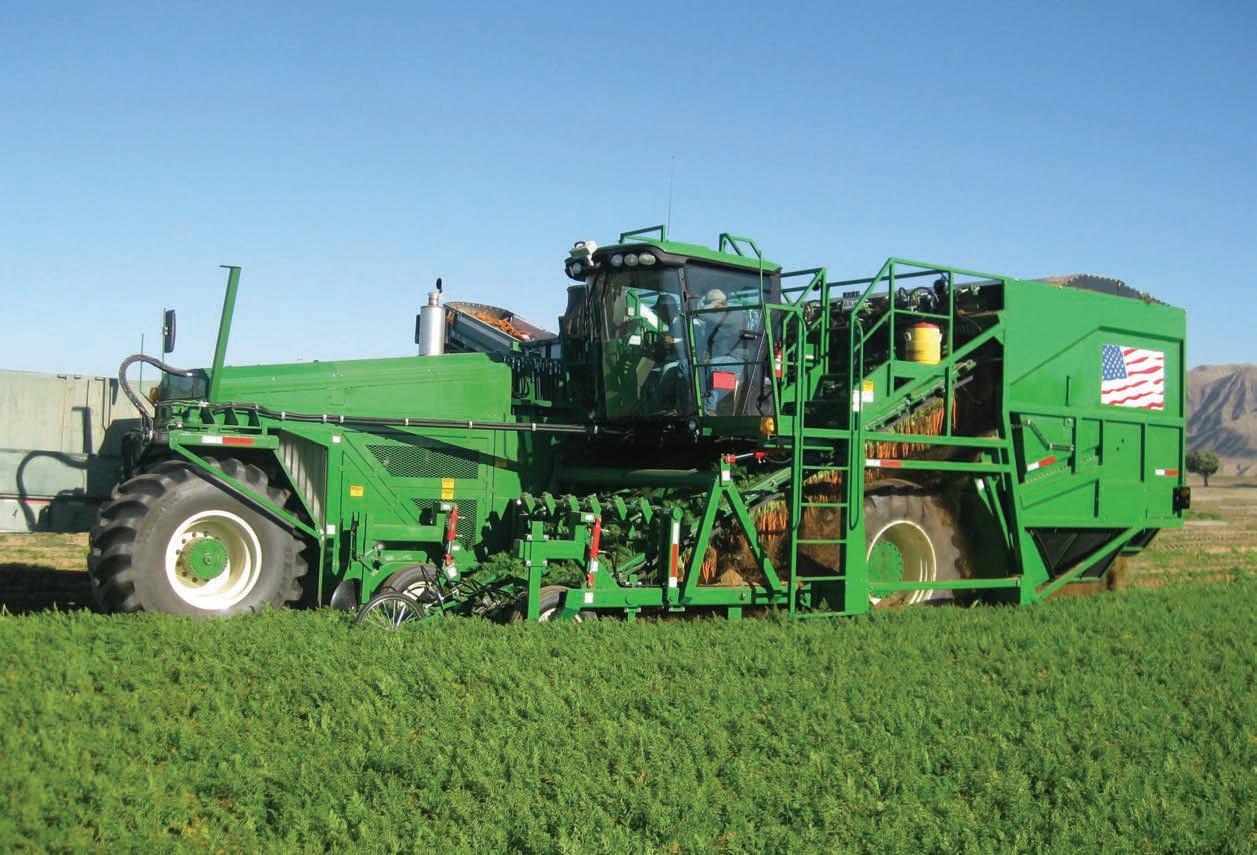





Vol. 30, No. 4







Vol. 30, No. 4
Brava from Bejo Seeds was one of 183 carrot cultivars and experimental breeding lines in a cultivar demonstration planted in Mount Vernon, Wash., for the International Carrot Conference. Read a recap of the conference’s presentations and field tours on page 4.

PO Box 333
Roberts, Idaho 83444
Telephone: (208) 520-6461 Circulation: (503) 724-3581 CarrotCountry.com
Editor Denise Keller editor@ColumbiaMediaGroup.com
Publisher / Advertising Manager
Dave Alexander dave@ColumbiaMediaGroup.com
Director of Operations Brian Feist brian@ColumbiaMediaGroup.com
Carrot Country is interested in newsworthy material related to carrot production and marketing. Contributions from all segments of the industry are welcome. Submit news releases, new product submissions, stories and photos via email to: editor@ColumbiaMediaGroup.com, or call (509) 697-9436.
For information on rates, mechanics, deadlines, list rental, direct mail, inserts or other information, call (208) 520-6461 or email: dave@carrotcountry.net
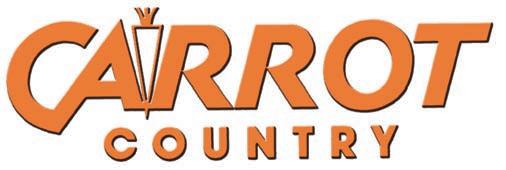
U.S. $20 per year Canada $30 per year Foreign $45 per year subscribe online at: www.CarrotCountry.com/subscribe or call (503) 724-3581
Email address changes/corrections to brian@ColumbiaMediaGroup.com or mail to: Carrot Country PO Box 333 Roberts, ID 83444
Carrot Country magazine (ISSN 1071-6653), is published four times a year and mailed under a standard rate mailing permit at Idaho Falls, Idaho and at additional mailing offices.
Produced by Columbia Media Group PO Box 333, roberts, Id, 83444
Copyright 2022. All rights reserved. No part of this publication may be reproduced or transmitted in any form or by any means, electronic or mechanical, for any purpose without the express written permission of Columbia Media Group.
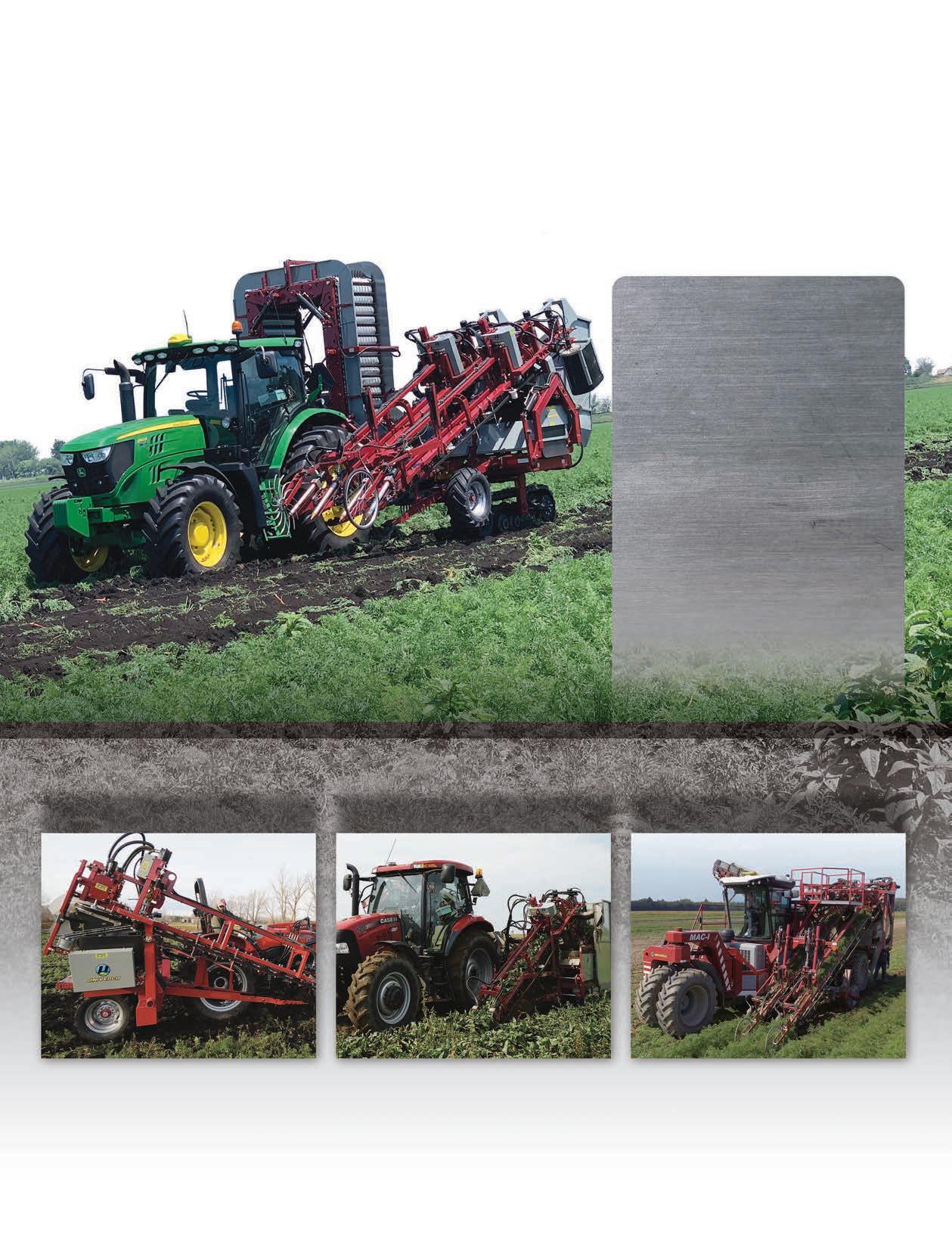




After a two-year postponement, the 40th International Carrot Conference gave nearly 100 attendees from nine countries a look at the latest research and issues impacting the carrot industry.
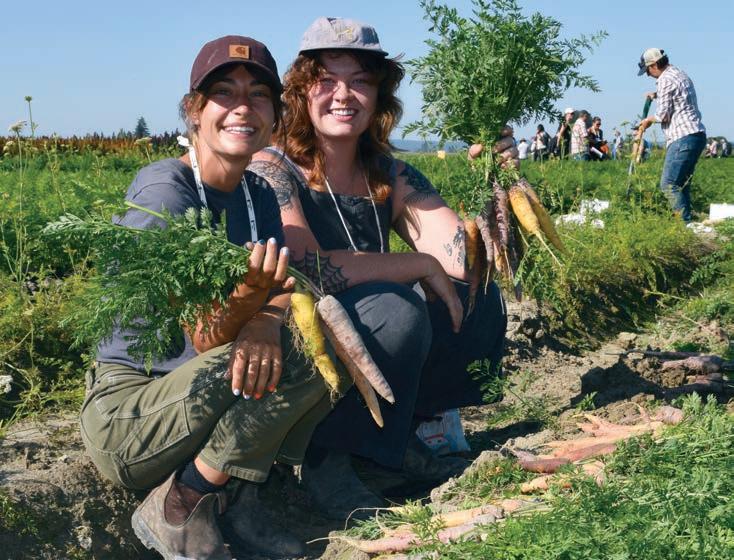
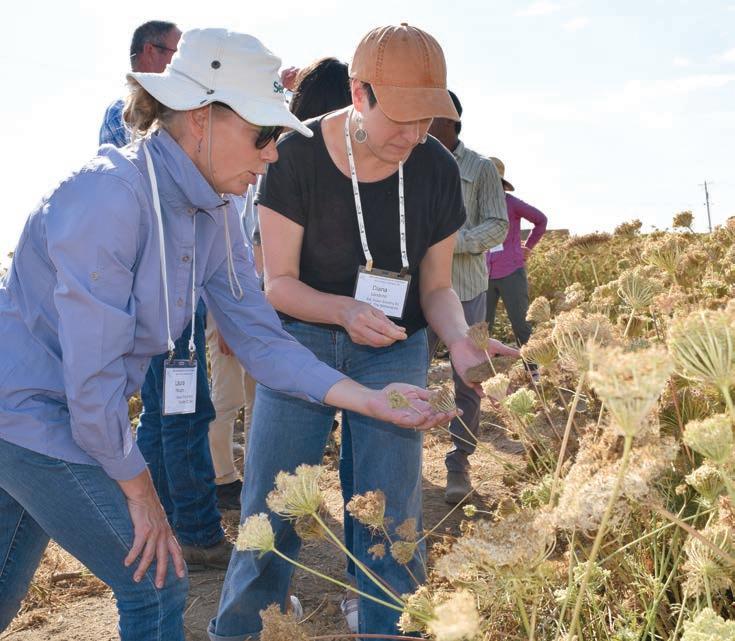
The conference, held Aug. 29-30 in Mount Vernon, Washington, hosted university researchers and grad students, as well as seed company reps, consultants, agronomists, breeders and a handful of growers. Attendance was lower than organizers had hoped, with the smaller turnout attributed to lingering concerns of international travel in the COVID era, as well as the meeting location. Participants of the 2018 International Carrot Conference, held in Wisconsin, voted to have the 2020 conference (which was rescheduled for 2022) in Western Washington despite the absence of any major carrot production in the area. Most carrot production in Washington takes place in the Columbia Basin in the central part of the state. This likely limited grower attendance, said Lindsey du Toit, conference organizing committee chair and Washington State University (WSU) vegetable seed pathologist.
For those who made the trip – with attendees hailing from the U.S., Canada, Brazil, Peru, France, the Netherlands, Italy, New Zealand and Japan – day one provided an overview of research being done on carrots in the U.S. Carrot breeders shared what traits they are selecting for, reporting on progress in breeding for flavor and weed competitiveness, as well as resistance to nematodes and diseases such as cavity spot and bacterial leaf blight.
Roger Freeman, a carrot breeder with Nunhems/BASF, added to the conference with the keynote address, sharing his experiences, thoughts and observations from 40 years as a commercial carrot breeder.
To illustrate the length of his career, he reminded his audience how much technology has progressed over the course
of the last four decades, mentioning the replacement of pay phones with smart phones and the transition from paper to digital data collection and storage.
Looking back on his career, Freeman first experienced carrot breeding in 1976 at Texas A&M University and then later completed his Ph.D. work on carrots at the USDA/University of Wisconsin before starting his career as a commercial carrot breeder in 1982 in Brooks, Oregon.


In his presentation, Freeman covered the history of commercial carrot production in the U.S., starting in the 1940s. This included the transition from open-pollinated varieties to hybrids, and the shift of production concentration from the eastern U.S. into California as the utilization of ice and refrigerated transport allowed for the availability of fresh, year-round supply. Speaking to more recent changes, Freeman detailed the development of two new market segments of cut-and-peel snacking carrots and novel-colored carrots. During these years, a very significant consolidation took place, through acquisitions, into much larger growers, retailers and global seed suppliers, Freeman recalled. He also spoke about the application of new digital and genetic tools, and the precision and efficiency improvements in farming and seeds.
While sharing experiences and perspectives related to commercial carrot breeding and production during his 40 years in the industry, Freeman also discussed the careers and contributions of three late university carrot researchers. This included the discovery and implementation of cytoplasmic male sterility into orange carrots, followed by the release to seed companies of an inbred line possessing this trait in 1963 by Dr. C.E. Peterson at Michigan State University. It was a very significant discovery and release and now the basis of almost all carrot hybrids used in North America and possibly a majority throughout the world, according to Freeman.
The conference moved from the classroom to the field for day two, beginning with the viewing of a cultivar demonstration at the WSU Mount Vernon Northwestern Washington Research and Extension Center (NWREC). Planted specifically for the conference, the trial included 183 carrot cultivars and experimental breeding lines. Unfortunately, the soil at the NWREC is a heavier clay soil that is not ideal for carrot production. As a result, some roots were
cracked and lacked acceptable uniformity in shape.
“Most people were very gracious about it. Some breeders said ‘We don’t mind this because it gives us a chance to see how well our varieties do under these kinds of conditions,’” du Toit said. “They consider it a purgatory trial. They put the varieties through purgatory and see how well they perform.”
A stop at Ralph’s Greenhouse demonstrated the difference in soil types across fields in Skagit County. Conference organizers had planted a 58-variety organic carrot cultivar trial at the farm, located in the fertile floodplain of the Skagit River. Grown in sandier soil, the roots looked very good.
The afternoon provided a broader look at agriculture in northwestern Washington. Agriculture is the top industry in Skagit County, with more than 90 different crops grown in the county. A visit to Washington Bulb Company provided a glimpse of the Skagit Valley’s flower bulb business. More tulip and daffodil bulbs are produced in Skagit County than in any other county in the U.S. The day wrapped
up with a tour of Skagit Valley Farm, where visitors made quick stops in fields of Brussels sprouts, broccoli and specialty potatoes.
Central Washington Tour Conference attendees were invited to stay a third day to tour the carrot industry in Central Washington. About 25 people took advantage of the opportunity to see the scale of production in the semi-arid growing region.
The tour started at Precision Seed Company near Ephrata. Although the group’s late-August visit came at the end of the carrot seed production cycle, they gained understanding of what it takes to produce carrot seed.
This was followed by a stop at WSU’s bee research facility in Othello, where the group heard a presentation on research related to pollinators.
The tour concluded at Klaustermeyer Farms in Basin City. Harvest was underway, and the grower’s novel method of topping carrots before pulling them from the ground intrigued the group and was an example of the insight participants – from


students to breeders – took home with them.
“When you understand the connection of what you do to the actual producer’s situation, it puts the context in place for your work, whether you’re a researcher like me or a breeder,” du Toit says. “You have a more thorough understanding of how carrots are grown, how they’re used and what kind of traits might be important from a breeding perspective.”

Providing learning opportunities through this conference depends on a team effort among researchers, universities, local seed companies and growers, du Toit said, adding that this is what makes the meeting most enjoyable for her.
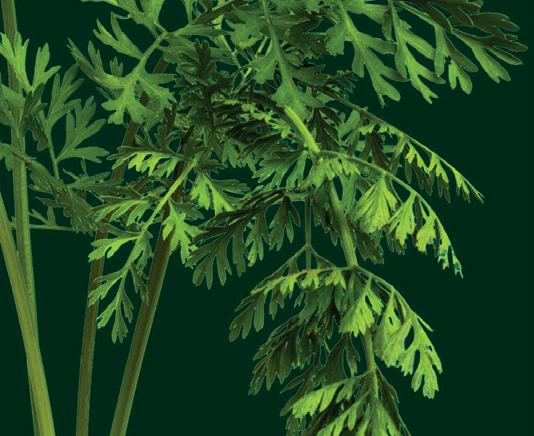

“It’s that sense of community that everyone is in this together to help support the ability to grow good carrots and a healthy supply of carrots,” du Toit said. “This conference is important for bringing people together to share, to understand better and to move forward as a whole community. That’s why we keep going and why we keep doing this work.”

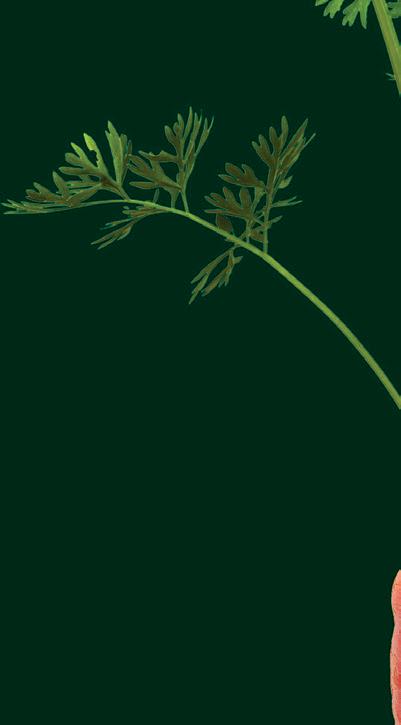
Abstracts, presentations and posters
from the conference can be found at www.internationalcarrots.org/2022presentations-and-posters.html.

The 41st International Carrot Conference is planned for spring 2024 in North Carolina.

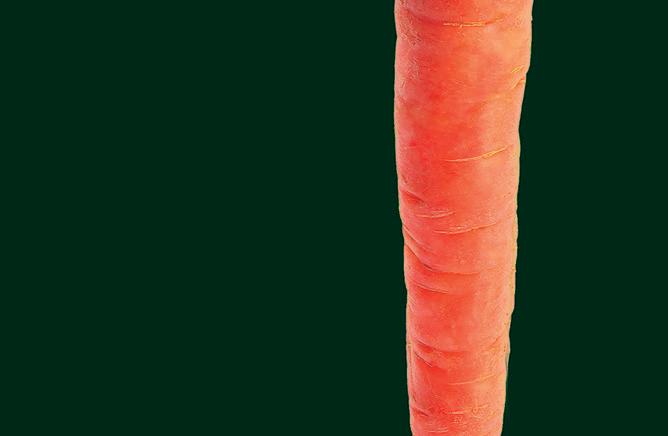
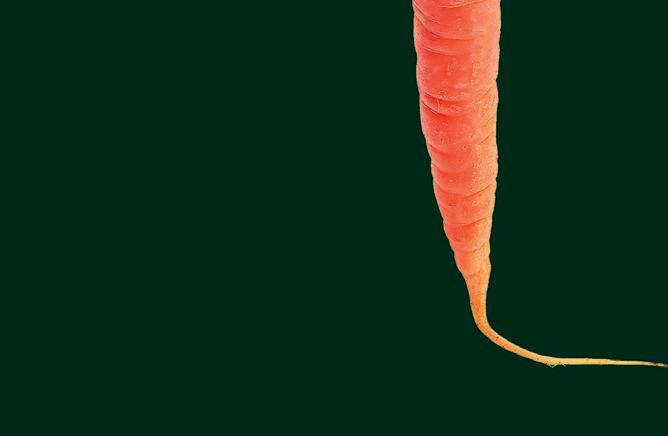
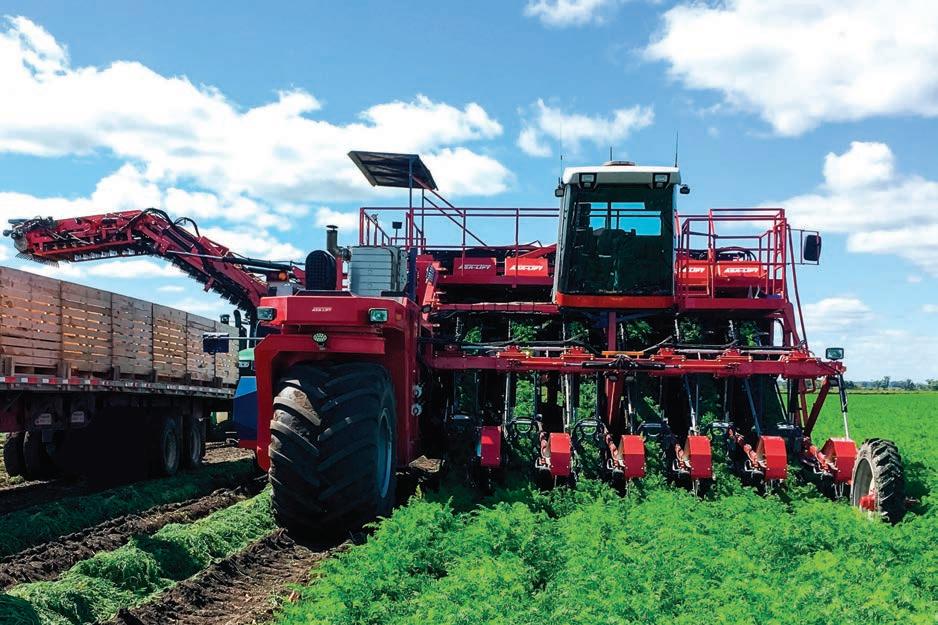


















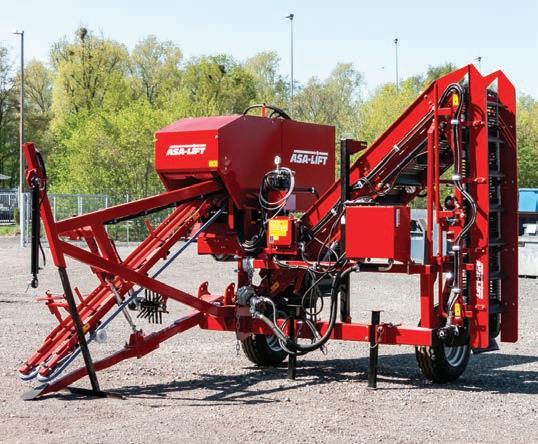

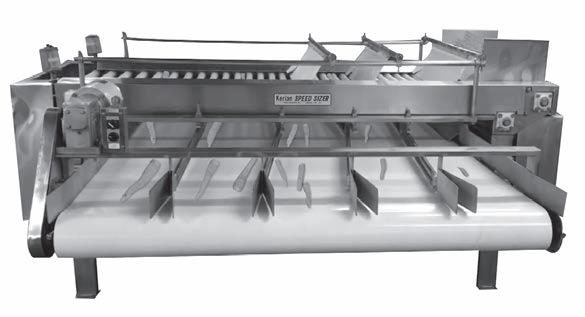
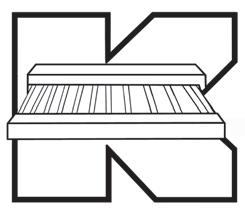
Carrot breeders appear to be making some progress in their work to breed nematode-resistant carrots. Carrots with nematode resistance were among the promising results of the 2022 USDAARS Hybrid Carrot Trial. Specifically, a few carrot hybrids that have nematode resistance, such as numbered lines C2145 and C208, did well in the cello category of the trial. Breeding nematode-resistant carrots is an ongoing goal of the USDAARS carrot research program in Madison, Wisconsin.
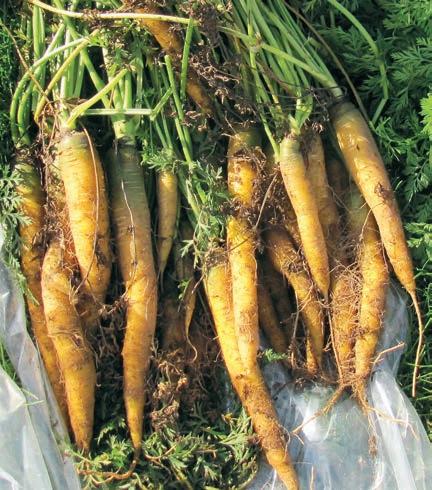
Carrots grown in the trial were on display and evaluated in late September
at the University of Wisconsin campus in Madison. Entries included 40 baby, 35 cello and 40 novel carrot hybrids from various seed companies and the USDA cooperative breeding program.
The trial was grown on sand at Paul Miller Farms near the University of Wisconsin Hancock Research Station. In general, the growing conditions were typical for the area with the exception of a cold, wet spring. There was also a heavy rain shortly after planting that caused the loss of a few plots.

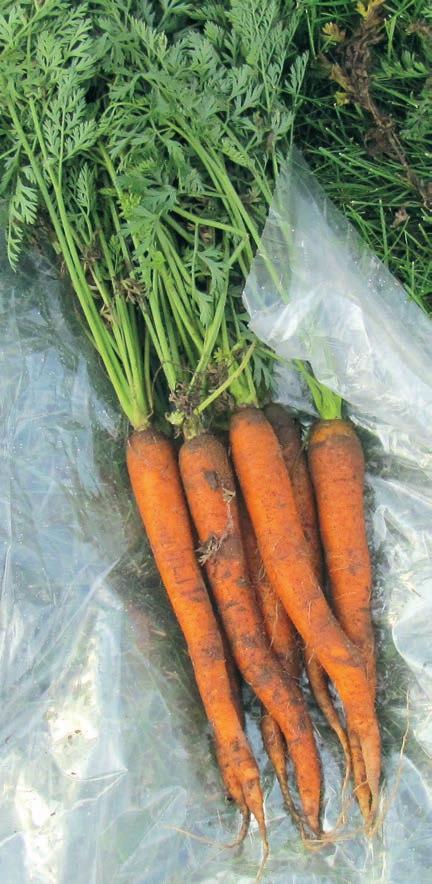
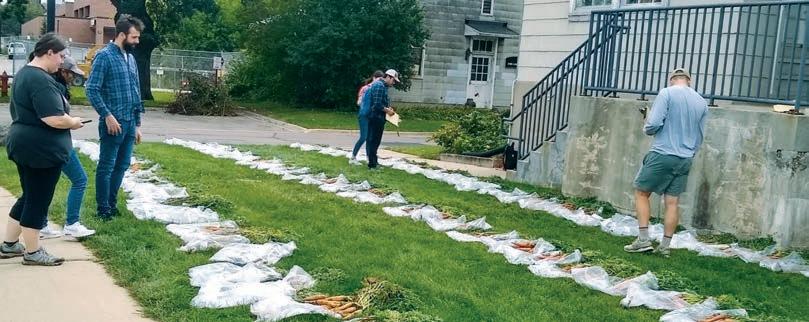
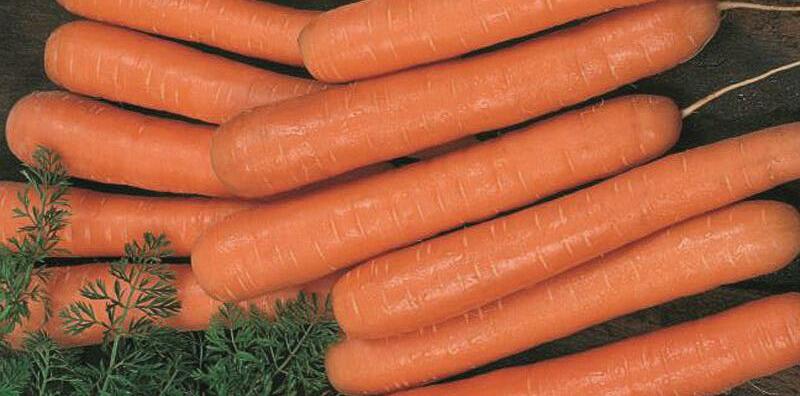
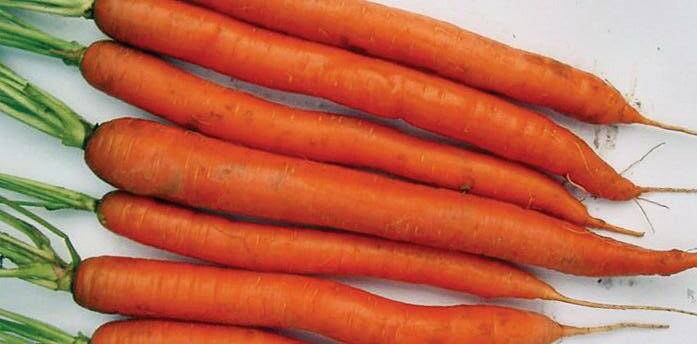
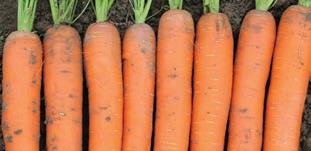
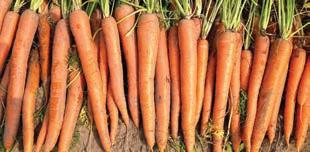




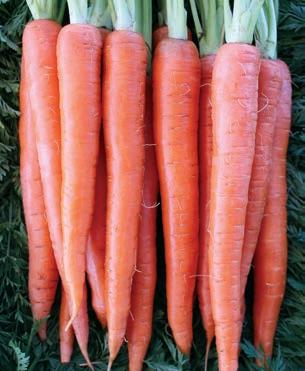
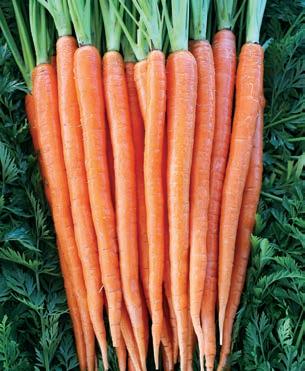
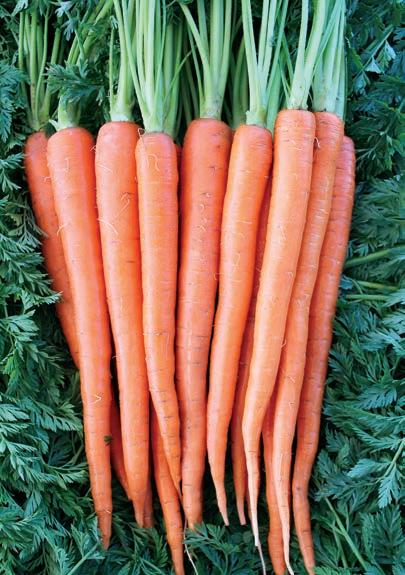
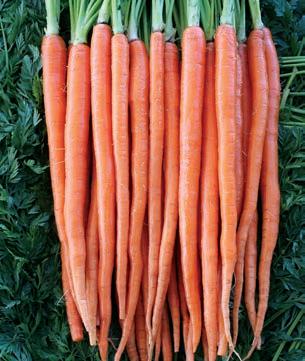
1200
Phone: (800) 733-9505
Paul.bender@vegetableseeds.basf.com www.nunhemsusa.com
A market standard for fresh whole carrots, Maverick offers exceptional adaptability and consistency with slightly tapered, long roots with good fill. The variety is normal maturing with a high percentage of cellos; root quality makes the product useful for other applications. The variety is popular for commercial organic production and produces consistent, excellent flavor, smooth skin and very good interior color.
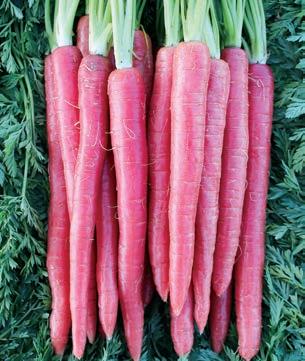
ReadyCut is an excellent option for cutand-peel processing. With a uniform, long, slender root shape for cuts of all diameter profiles, this variety features a high percentage of premium pieces under 5/8-inch diameter. Carrots have good flavor, crunchy texture and durable roots for a lower percentage of cracking and breaking.
RubyPak features red exterior and interior color and grows crispy, excellent-tasting carrots. This excellent spring-planted red carrot hybrid (with less bolting than RubyQueen for spring and summer harvest) features smaller and clearly less vigorous foliage than the other colors and has some bolting in the spring and early summer harvest slots.
TrophyPak is an early-maturing and vigorous cello/jumbo hybrid with exceptional adaptability and consistency. The variety produces a high percentage of cellos while also flexible for use in making jumbos. Carrots feature vigorous and upright foliage, high tolerance to Alternaria dauci and powdery mildew, and tapered roots with excellent tip fill.
UpperCut is a highly adaptable carrot ideal for organic production as a result of foliar resistances. The variety features vigorous foliage and good resistance to Alternaria dauci and powdery mildew. It is an excellent option for cut-and-peel processing and features long roots with very good flavor and crunchy texture.
ReadyCut rubyPak Maverick TrophyPak1972 Silver Spur Place Oceano, CA 93445 (805) 473-2199 www.bejoseeds.com info@bejoseeds.com

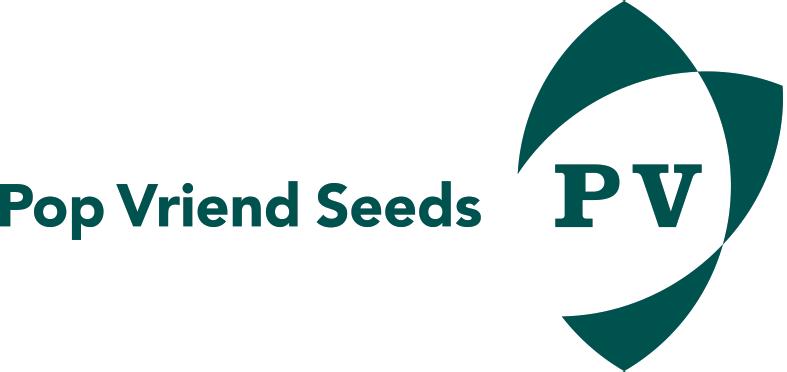
Miami produces consistently uniform cylindrical roots with exceptionally sweet carrot flavor. Bright orange roots grow stouter as they mature. Attractive feathery tops are perfect for fresh market bunches. The variety is well adapted for early- or main-season successions. Miami has intermediate resistance to Alternaria leaf blight, black rot, cavity spot, Cercospora leaf blight and liquorice rot. It is also available as organic seed.
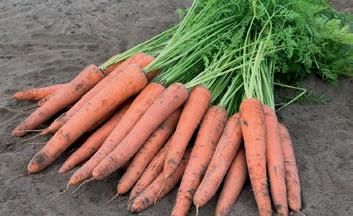
Naval is a Nantes type that produces very shapely, uniform, hairless roots 7-9 inches long. Crisp and sweet, Naval resists cracking with an added bonus of a long shelf life. The variety has intermediate resistance to Alternaria leaf blight, black rot and Cercospora leaf blight. It is also available as organic seed.
An easy-growing, mid-early Nantes variety with nice flavor and texture, Narvik roots are uniform and cylindrical. Tops are strong, healthy and erect. Overall, Narvik holds well in storage. It is adaptable to standard or high-density spacing and has intermediate resistance to black rot, Cercospora leaf blight and cavity spot. Organic seed is available.
A nice cello/slicer carrot, Jefferson produces smooth and slightly tapered roots that are a dark orange color with no green shoulder, good length and very uniform. With a maturity of 75-80 days, the variety has intermediate resistance to Alternaria leaf blight, black rot and cavity spot.




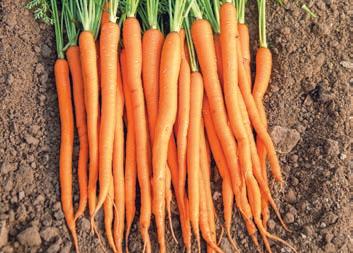
This Imperator cut-and-peel variety offers very high field durability and uniformity and high processing performance. Carrots have very smooth skin, uniform coloration of the core and are easy to cut. These features, combined with great flavor and good top attachment, make this variety a real champion.
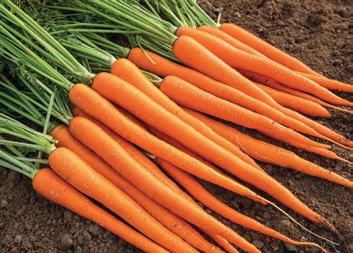
This Imperator cello type is unique because it has an excellent flavor. Jacinto offers great durability and uniformity. Roots are uniform with smooth skin and good top attachment. With good core definition and a medium dark color, the Jacinto is exactly what you are looking for.
With good flavor, Istanbul is a nice uniform carrot for cellos and slicers. It is an Imperator type with strong tops and 9- to 11-inch roots. Well adapted, the variety performs well on both muck and mineral soils. Istanbul has intermediate resistance to Alternaria leaf blight, black rot and Cercospora leaf blight. The variety is also available as organic seed.
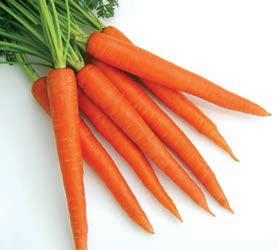

701A LaGuardia St. Salinas, CA 93905 (831) 455-3000 www.rijkzwaanusa.com contactusa@rijkzwaan.com
New in 2021, Ymer is a Berlicum/Nantes-type hybrid for fresh market and suitable for long storage. Reaching maturity in 130 growing days, the variety features strong, dark green foliage, and a nice cylindrical shape, growing to 8 inches. High carotene and Brix value are maintained through storage.
Set to become commercial soon, Ellis is a Nantes-type hybrid for fresh market and suitable for long storage. This variety needs 120-140 growing days for full blunt length. The variety is strong against breakage and splitting and has strong foliage for mechanical harvest, stress and disease pressure. High carotene and Brix value are maintained through storage.
Set to become commercial soon, Hestan is a Nantes-type hybrid for fresh market and suitable for long storage. The variety takes 130-150 growing days for full blunt length. Strong against breakage and splitting, this variety is a very uniform and good yielder with strong foliage for mechanical harvest, stress and disease pressure. High carotene and Brix value are maintained through storage.
Holland, MI 49424 (800) 962-4999 www.stokeseeds.com customerservice.us@stokeseeds.com

days, Apache produces very smooth, dark, 10inch orange roots with strong attachment. The variety is great for cello and bunching.
With a maturity of 70 days, Orange Blaze has smooth, cylindrical, vigorous 9-10-inch roots. It is adaptable to muck, mineral and deep peat soils and is easy to harvest with high yield potential.
At 68 days, SV2384DL produces dark orange, thick 12-inch cylindrical roots for mineral or muck soils. Roots have semi-blunt tips with small cores.

Caravel is a mid-seasonmaturing, cylindrical 10-11inch carrot with a slight taper, blunt tip, strong attachment and attractive skin coloration.

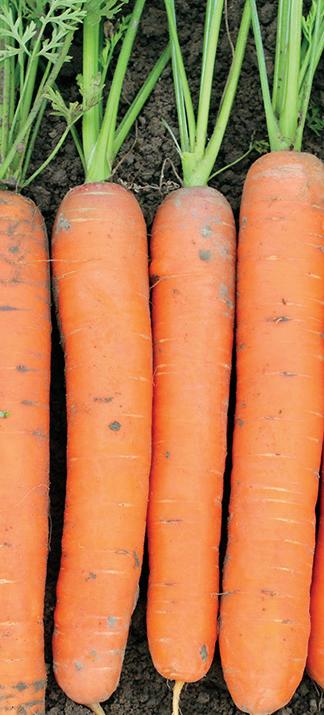
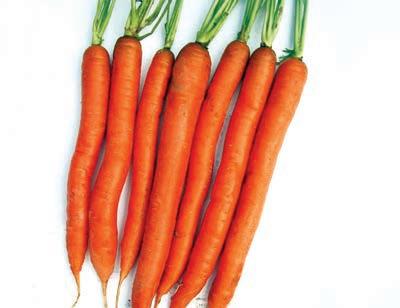


www.vegetables.bayer.com

SVDC1978 has very good root shape and size uniformity in combination with good top attachment and plant vigor. Long roots with excellent tops make SVDC1978 an attractive cut-and-peel carrot in the Seminis portfolio. With tolerance to powdery mildew and the combination of root quality and top vigor, growers will be rewarded with a high yield potential.
SVDC2089 is a cut-and-peel variety with excellent plant health and good root uniformity and eating quality, which will provide a high yield to growers. This variety can be grown in all cut-and-peel carrot growing regions in the United States, especially the organic market where top health is very important.
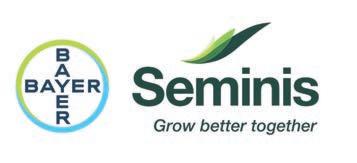


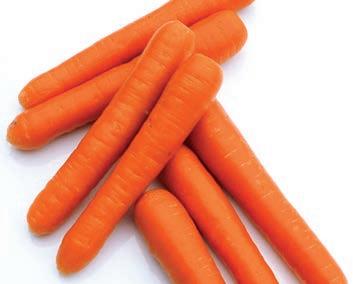
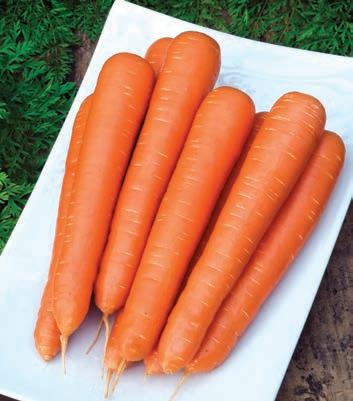
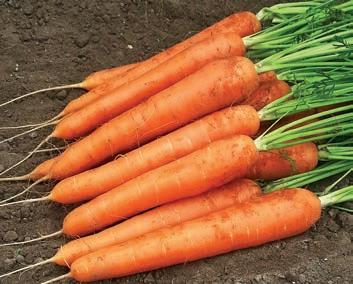

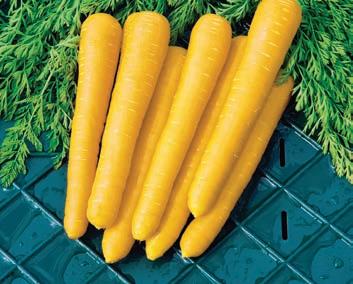
SVDC2089 has good tolerance to powdery mildew and a superior root with good length and uniformity. Its excellent texture and flavor, clean top, and root length and uniformity make SVDC2089 a great option for growers.
3 Harris Place Salinas CA, 93901 (831) 771-1500 www.vilmorinmikado.us.com
With maturity at 120 days from sowing, Siroco produces uniform fruit suited well for slicing and cello Nantes markets. Strong tops hold well late into the harvest season, standing up to disease and weather alike.
Bolero has been a global industry standard for more than 30 years.
This main-season yellow Nantes variety hits maturity 120-130 days from sowing and yields beautiful, smooth roots with excellent flavor.
This extremely early Nantes is paired with out-of-this-world uniformity. Strong tops make top lifting easy, an added bonus to the 90-day turnaround Speedo will give you.
A workhorse for the processing and storage market in North America, Volcano makes late harvests more reliable with high marketable yields paired with great storage capacity.
Speedo Gold Nugget SirocoTessenderlo Kerley Inc. held a celebratory groundbreaking to mark the commencement of construction on a new liquid fertilizer facility in Defiance, Ohio. The 50,000-squarefoot production facility will occupy 50 acres and is set to become operational in 2024. The facility will serve the eastern Great Lakes region through its distribution partners and will include terminal load-outs for railcars and tanker trucks.
Tessenderlo Kerley will produce its liquid sulfur-based crop nutrition brands such as Thio-Sul, KTS and K-Row 23, as well as sulfite chemistries for the industrial market.

Nov. 29
UK Onion & Carrot Conference & Exhibition East of England Showground Peterborough, England www.onionandcarrotconference.co.uk dec. 6-8
Great Lakes Fruit, Vegetable and Farm Market EXPO DeVos Place Conference Center Grand Rapids, Mich. Oct. 2-5, 2023
International Carrot and other Apiaceae Symposium York, England www.carrotsymposium.com
The Organic Produce Network has chosen longtime organic grower Jeff Huckaby as the recipient of the fifth annual Grower of the Year award. Huckaby, president and CEO of Grimmway Farms, was selected based on his ongoing commitment and dedication to excellence in organic production, organic industry leadership and innovation. The Organic Produce Network praised Huckaby for encouraging water conservation and natural methods for pest control, as well as for sharing information about these practices with other organic growers.
Huckaby, a fourth-generation farmer, joined Grimmway Farms in 1998, managed its organic division and became president and CEO in 2016. During his tenure, the program has grown from several hundred to 40,000 acres of certified organic ground.

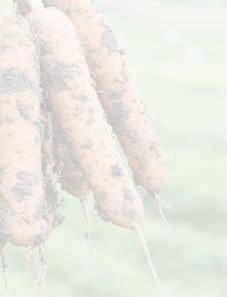

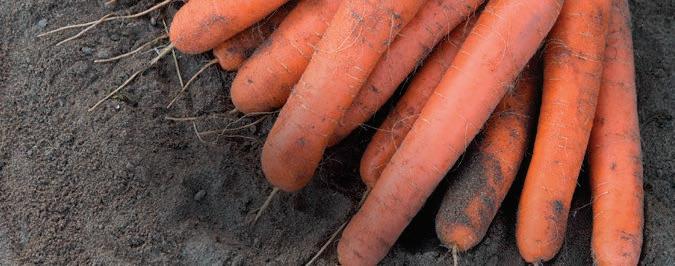
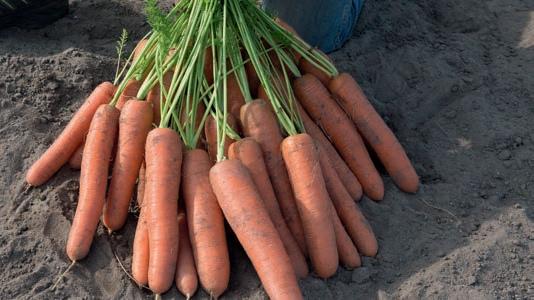

Very full-sized Nantes with strong dark green tops and cylindrical, smooth blunt roots. A specialized variety with a sweet taste when sown in fall for winter harvest.
Resistance IR: Ar / Cc / Ps, Pv
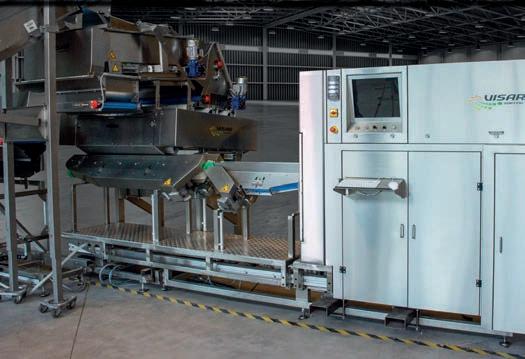





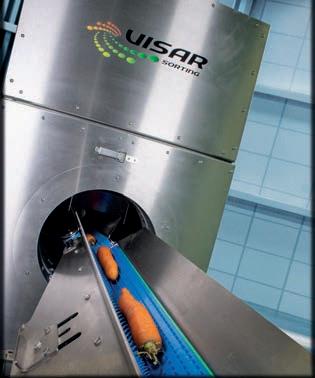

Similar to Nelson, with more uniform roots and plant vigor. The 5 1/2–6 1/2” roots have mild flavor and crisp, juicy texture with early sugar development. Strong, compact tops for bunching.
Resistance IR: Ar / Cc / Ps, Pv
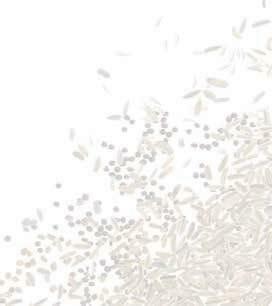
Chelsey Lenczyk - Organic Lead, Home & Farm Market Manager
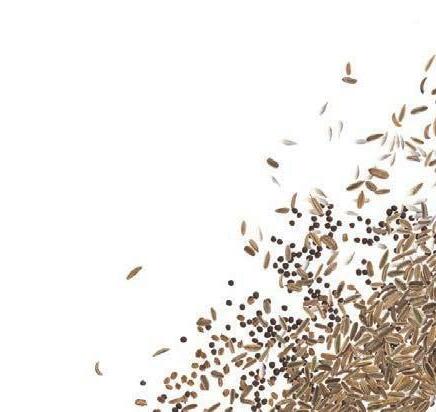
T: 267-838-0078 E: c.lenczyk@bejoseeds.com
A Nantes type that produces very shapely, uniform, hairless roots 7-9 inches long. Crisp and sweet, Naval resists cracking with an added bonus of a long shelf life.
Resistance IR: Ad / Ar / Cc
bejoseeds.com
